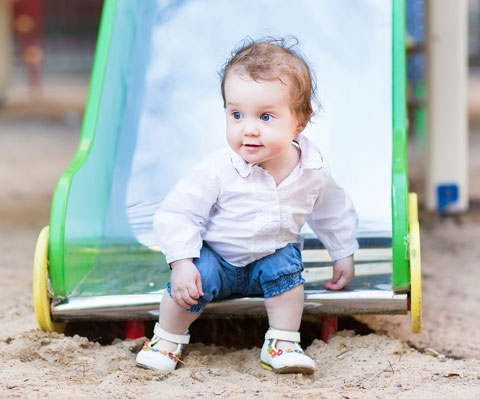Newborns are completely dependent on their caregivers. As the weeks and months go by, they are able to do more and more. “New” skills develop quickly: smiling, reaching and grasping a toy, sitting up, scooting and crawling, cruising, and, eventually, that first independent step. Families and caregivers are excited to cheer on each new skill.
Families, teachers, and caregivers want young children to be successful. It can be hard to watch a child struggle or become frustrated. Sometimes, well-meaning adults think they are helping young children by doing things for them. However, it can be both safer and better for adults to encourage children to try things on their own or provide limited supports that encourage children to use their skills to complete part of a task.
You may have noticed that some children start talking sooner or later than others. Children reach developmental milestones at different times. Some children will need different or special supports and will meet milestones at a very different pace. Regardless of a child’s timeline on a particular skill or understanding, there are many ways that parents, caregivers, and teachers can help them develop abilities to help themselves and others in daily activities.
Imagine a group of 4 year olds trying to climb a slide’s ladder. One child may climb on her own, while a teacher may need to show another how to alternate his hands and feet by tapping on which foot or hand should be used next. Another child might be too afraid to climb up and need verbal encouragement and emotional support from an adult.
In the case of a child who is fearful or struggling to get up the ladder, adults may be tempted to help a child “too much” and just put them on the top or slide down with them. After all, the child may be focused on just being able to use the exciting slide. However, a child will be much safer, confident, and competent in using the slide by herself if adults resist that first impulse to just get her to the top and instead encourage her to try harder to climb up the ladder.
Here’s some ways adults can encourage young children to try and try again while providing a little support so they can do things on their own:
- If a child is upset about a lost item, help them develop their problem solving skills by asking questions or helping them look for it rather than finding it for them. Ask them “Where did you think you last gave teddy a hug?” or say “let’s start looking in your cubby, and then we will check the block shelf.”
- If a child is overwhelmed by a cleanup task after playtime, rather than clean up for him, break it down and provide a specific plan to get the job done together. Say, “I will be in charge of putting the books on the shelf, and you are in charge of getting the animals in the basket.”
- If a child gets frustrated trying to zip her coat, rather than zipping it for her, reach from behind and show her how to start the zipper. Then encourage her to finish by letting her pull the zipper all the way up. This will give her a feeling of success and helps her slowly learn how to zip her coat by herself.
There are many moments throughout the day when young children are gaining skills to become independent. Finding the right level of support for young children is a balancing act for the adults who care for them. Adults can find that balance for a child over time through experimentation and self-reflection. With the right balance, children can develop the persistence to try and try again, which will benefit them as they meet future challenges.

Rebecca Swartz
Dr. Rebecca Swartz is an assistant professor in the Department of Teaching and Learning at Southern Illinois University Edwardsville. She teaches courses in the early childhood education program including courses on early language and literacy, early mathematics, and collaboration with families. Prior to coming to SIUE she was an early learning specialist on state early childhood projects in the Department of Special Education at the University of Illinois at Urbana-Champaign.
Biography current as of 2022
IEL Resources
- Tip Sheet: Freedom to Grow
- Resource List: Self Regulation and Executive Function
- Video: Problem Solving


